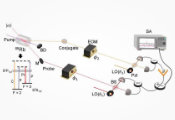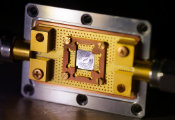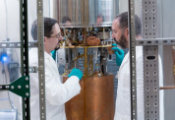Max Planck Center Inaugurated in Taiwan
September 04, 2025 -- Theories describing the Universe at the smallest scales (particle physics) and the largest scales (cosmology) — from the Standard Model of particle physics to general relativity — are each remarkably successful. Yet they remain fundamentally incompatible. To help close this gap and gain a deeper understanding of the Universe in all its dimensions, the Max Planck–IAS–NTU Center for Particle Physics, Cosmology, and Geometry has been established. The collaboration is designed for long-term exchange, early-career training, and open science.
“By combining the expertise and scientific potential of our three partner institutions, we are creating a global hub for excellence and knowledge transfer in theoretical physics,” says Johannes Henn (MPP). “The Center fosters collaboration across institutional and disciplinary boundaries. This creates synergies — for example, in developing new mathematical tools for quantum field theory, in describing elementary particle interactions, or in understanding the physics of the early Universe.”
Particle physics investigates the fundamental building blocks of matter at scales smaller than the proton or neutron, while cosmology explores the structure and evolution of the Universe as a whole. In recent years, surprising connections between particle physics, cosmology, and geometry have emerged, opening new avenues for describing particle scattering and probing the initial conditions of the Universe after the Big Bang. By uniting these three disciplines, the MPC aims to generate insights that would otherwise remain out of reach.
“One of the most remarkable discoveries of modern cosmology is that the hot Big Bang was not the beginning of time. A fascinating question is what happened before the hot Big Bang and how it set the initial conditions for the structures we observe in the late Universe,” explains Daniel Baumann, Chee-Chun Leung Professor of Cosmology at NTU. “With this Center, we bring together expertise in particle physics, cosmology, and geometry to find new answers to fundamental questions about the Universe’s origin and evolution.”
“Just ten years ago, particle physicists and cosmologists would have considered it absurd that the description of colliding elementary particles might have anything to do with combinatorics, algebra, or geometry. Mathematicians felt the same,” says Nima Arkani-Hamed, Gopal Prasad Professor at the IAS School of Natural Sciences. “The fact that these connections have now proven real is a stimulating surprise — and an opportunity. This Center will help us deepen our understanding of this groundbreaking discovery.”
The official inaugural symposium was held from September 1–3, 2025, at NTU. Research operations had already started a few months earlier, in July 2025. A kick-off conference is scheduled for March 16–20, 2026, at IAS. The initial funding period covers five years. The MPC is co-directed by Johannes Henn (MPP), Nima Arkani-Hamed (IAS), and Daniel Baumann (NTU). Deputy co-directors are Matias Zaldarriaga (IAS), Bernd Sturmfels (MPI-MiS), and Yu-Tin Huang (NTU).




































